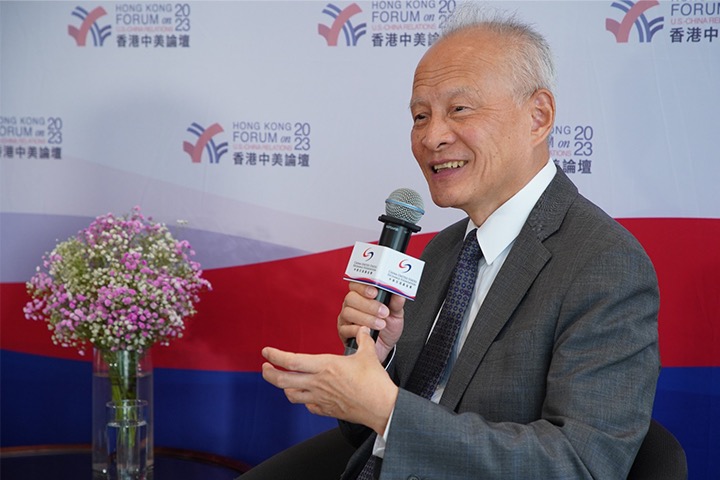The China-United States Exchange Foundation (CUSEF), a non-profit organization that builds trust and understanding between the two countries, is commemorating its 15th anniversary with ‘CUSEF 15,’ a year-long initiative where eminent figures will have 15 minutes to share their insights on the issues shaping the global future.
Ambassador Cui Tiankai, former Ambassador of the People’s Republic of China to the United States of America, was the featured speaker at the inaugural event for 'CUSEF 15' in Hong Kong, coinciding with the highly anticipated talks between President Xi Jinping and President Joe Biden at the APEC Leaders’ Meeting in San Francisco on November 15.
Ambassador Cui said at the launch of ‘CUSEF 15’: "[Confrontation] is not good for the interests of the United States. Of course, China does not want to confront the United States. Both sides feel that there is a need to change their practices in previous years, to find a new way. President Xi suggested trying to find the right way to get along when he met with President Biden in Bali last year. For the two countries, no one is able to change the other, and no one is able to try to defeat the other. There must be a right way to get along with each other.”
He continued: “In fact, from President Xi’s first meeting with President Obama until now, the basic meaning President Xi said is the same: that is, the two countries should not conflict or fight with each other, but should respect each other, co-exist peacefully, and cooperate wherever possible. I believe this time it is also in this spirit that China goes to San Francisco to meet the U.S. counterpart.”
"The relationship between China and the United States is probably very complicated: after taking a few steps forward, it pauses, encounters setbacks, and then continues to move forward. It will probably be like this for a few more years. However, a journey of a thousand miles begins with a single step. As long as we keep moving in the right direction, we can always get it," Ambassador Cui said.
"Don't neglect doing good deeds because they are small. As long as they are right and good things, you need to do them even if they are small. Gradually, small things will accumulate into big things. I think, as long as we act in this way and with the spirit of ‘bottom-line thinking’, and working in the best direction, we can still generally stabilize Sino-U.S. relations.”
Currently in Hong Kong to speak at the ‘CUSEF 15’ event, Ambassador Cui has played a pivotal role in U.S.-China relations, serving as China’s top diplomatic envoy from 2013 to 2021, covering three presidential administrations, from Barack Obama to Donald Trump, to the start of Joe Biden’s current term in office.
Beyond his ambassadorial duties, Cui was instrumental in navigating bilateral challenges during the COVID-19 pandemic. He was a key participant at the bilateral meeting in Alaska in March 2021, when he joined Yang Jiechi and Wang Yi in their meetings with the U.S. Secretary of State Antony Blinken and National Security Advisor Jake Sullivan.

Mr. James Chau, President of CUSEF, remarked, "Ambassador Cui Tiankai's compelling words at ‘CUSEF 15’ are testament to the critical moment before us: only through increased dialogue can we build the trust and understanding necessary to stop the decline in the U.S.-China relationship, positions it at the frontlines of collaborative global leadership, and unlock its potential to consign contemporary challenges to history. Once again, CUSEF is the convening platform for diverse opinions and voices—and this inaugural event of our ‘CUSEF 15’ initiative is an expression of our enduring commitment to foster dialogue with global figures, no matter the conditions.”
The ‘CUSEF 15’ event follows CUSEF’s annual meeting, the Hong Kong Forum on China-U.S. Relations, held on November 9-10, where China’s Ambassador Xie Feng and U.S. Ambassador Nicholas Burns called for continued communication in a notable expression of public unity. Twenty-four hours after their opening address to CUSEF’s Hong Kong Forum, the upcoming meeting between the two Presidents in San Francisco was confirmed, emphasizing the significance of bilateral exchanges on both governmental and non-governmental levels and of providing platforms to connect people and ideas.
When President Biden and President Xi met on November 15, it was their first opportunity to engage in-person since their last physical meeting exactly one year ago at the G20 Summit in Bali.
